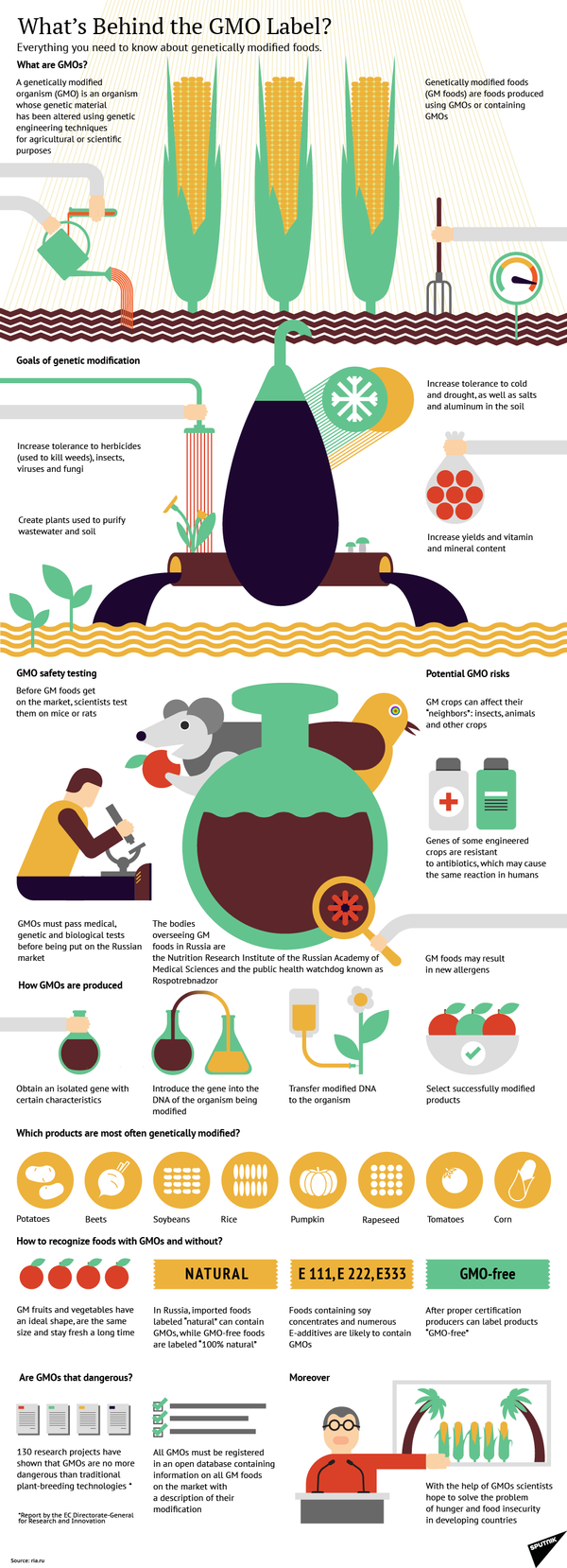WASHINGTON (Sputnik) — On Thursday, the House passed the Safe and Accurate Food Labeling Act of 2015 (HR 1599) that has been dubbed by its opponents as the Deny Americans the Right to Know Act, or ominously abbreviated as DARK.
“Republicans love to say that they believe in states' rights and a free market,” OCA said on Friday. “This law obliterates both.”
The legislation requires GMO labeling of foods only if they are found to be unsafe by the US Food and Drug Administration, while invalidating states’ laws that require GMO labeling.
“Of the members who voted in favor of HR 1599, it can only be said that they were either influenced by corporate donations, or dismally misinformed by industry propaganda,” the OCA said.
The advocacy group suggested the House passed the bill to protect influential corporations, which have been deceiving US consumers for years.
The OCA stated the bill is an “outright attack” on states' rights and goes counter to the wishes of 90 percent of Americans who support mandatory GMO labeling.
‘We will reach out to all parties, all ages, all genders, all religions — because the bill is inconsistent with the values of the majority of Americans,” the OCA noted.
In April 2015, the US non-profit Environmental Working Group said companies and groups that oppose GMO labeling such as PepsiCo, Kellogg and Coca-Cola, spent more than $63 million on lobbying.
US to See Protests if Anti-GMO Labeling Bill Becomes Law
Americans will organize protests if the anti-GMO labeling legislation that passed the House of Representatives on Thursday becomes a law, advocacy group Citizens for GMO Labeling board member Tara Cook-Littman told Sputnik.
“The citizens of this country will absolutely be pushing back, protesting,” Cook-Littman said on Friday.
On Thursday, US House passed the Safe and Accurate Food Labeling Act of 2015 (HR 1599) that has been dubbed by its opponents as the Deny Americans the Right to Know Act or DARK.
The legislation that now heads to the US Senate, requires GMO labeling on foods only if they are found unsafe by the US Food and Drug Administration. Moreover, the legislation invalidates state laws that require GMO labeling.
Cook-Littman argued the United States needs a clear law for GMO labels that would protect consumers.
“There needs to be a strong federal solution, not something like that act they just passed in the House.”
Manufacturers in more than 60 countries are required to label foods containing GMO ingredients. In the United States, GMO labeling is not mandatory and companies do not do it on voluntary basis.
Food, Biotech Industries Lobby for GMO Products Affects US Congress
The bill against mandatory GMO labeling that passed the US House of Representatives on Thursday highlights the ability of biotech and food industries to influence the Congress, US advocacy group Citizens for GMO Labeling board member Tara Cook-Littman told Sputnik.
“This vote further highlights the influence the food and biotech industry has over our elected officials,” Cook-Littman said on Friday.
Cook-Littman argued that the vote has served “to galvanize the grassroots efforts” around the United States demanding food system transparency.
“Considering the fact that polls consistently show that over 90 percent of Americans want GMO labeling it is clear Congress is not representing the interests of the American people,” Cook-Littman said.
However, Citizens for GMO Labeling group does not view the House action as a loss or a setback.
In April 2015, the US non-profit Environmental Working Group, which advocates for public health, said in 2014 companies and groups that oppose GMO labeling, such as PepsiCo, Kellogg and Coca-Cola, spent the total of $63.6 million in lobbying expenditures.



